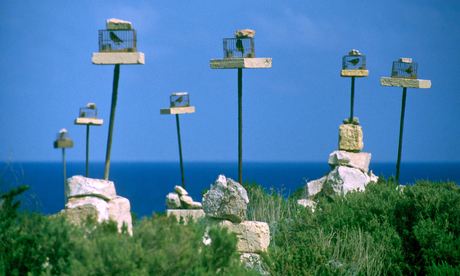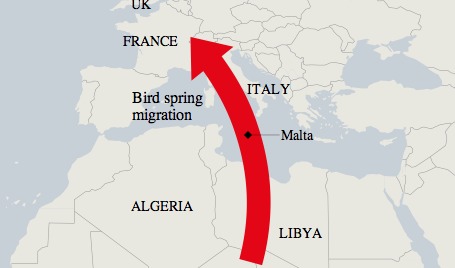[SEE BRIAN’S REPONSE ON SOAPBOX]
COMMENT ON BRIAN MAY IN TIMES OF MALTA “QUOTES OF THE WEEK”- and article in the Guardian
TIMES OF MALTA
20 April 2014
Columnist Martin Scicluna laments the reaction of some Maltese to comments made by Queen guitarist and animal rights campaigner Brian May about hunting:
“We behave like petulant children stamping our Lilliputian feet whenever we are criticised by foreigners.” MARTIN SCICLUNA
Refers to article: HERE
—
and article today in The Guardian
THE GUARDIAN
CONSERVATIONISTS AND MARKSMEN OF MALTA BATTLE OVER ANUNAL BIRD HUNT
20 April 2014 by Patrick Barkham in Malta

Hunters try to block referendum on traditional spring shoot, while British volunteers help patrol countryside to protect birds
Caged birds are kept to attract wild birds for shooting in Malta. Photograph: Chris Howes/Alamy
As dawn breaks over the sea and ancient stone churches turn pink, the morning’s stillness is broken by volleys of gunfire. Tucked behind walls, sitting on armchairs in specially built turrets or else popping up from old stone sheds, Malta’s marksmen open fire as migrating birds flap desperately for cover.
When it comes to bird hunts, this is one of Europe’s more uneven contests. Birds flying over the islands of Malta on their annual migration to northern Europe must evade 31 licensed marksmen per square kilometre – 15 times more than in shooting-friendly France. On one day in 2013, more than 9,000 shots were logged by a conservation charity’s observers.
Spring hunting is banned by the EU but the Maltese authorities obtain a exemption each year, enabling its 9,798 hunters to shoot 5,000 quail and 11,000 turtle doves, the latter a migratory bird whose British population has slumped by 95% since 1970.
But now a backlash is being felt. More than 44,000 Maltese citizens have signed a petition calling for a referendum on the traditional spring shoot.
And a flock of celebrity naturalists including Brian May, Chris Packham and Bill Oddie have swooped in, joining mostly British and Dutch volunteers patrolling the countryside at 5am each morning to monitor illegal shooting for the charity BirdLife Malta.
Packham will broadcast his confrontations with hunters on YouTube every day this week.
Steve Micklewright, executive director of BirdLife Malta, said: “The birds flying from Africa to northern Europe in the spring are the strong birds. They’ve survived the winter. If we don’t allow these birds to breed, their populations stand no chance of recovery.”
As a roosting marsh harrier rises from a field of barley displaying wings tattered from shotgun pellets, Nimrod Mifsud, a Maltese volunteer for the charity, says local birdwatchers take little pleasure in seeing a rare bird. “The first birds I’ve seen – my first stork, my first peregrine, my first glossy ibis – they all fell out of the sky, shot,” said Mifsud. “That affects you. There’s only so much you can take.”
Last year, the Maltese army was deployed during the spring shoot after recent years in which naturalists had their cars set alight and a BirdLife Malta warden was shot in the face.
But Joseph Perici Calascione, head of the Maltese Federation for Hunting & Conservation (FKNK), said hunters felt bullied by foreign activists monitoring illegal shooting in Malta’s countryside.
“I would like to see some Maltese lads going to the UK to try to stop one of their traditions. It’s not nice to be treated as a third-world country. You [the British] shoot lots of migratory birds such as ducks and geese but it’s only bad when the Maltese do it,” he said.
Sergei Golovkin, head of the Maltese government’s wild-bird regulation unit, said there was “an element of hypocrisy” in international criticism. “Unfortunately, some NGOs [non-governmental organisations] have chosen very aggressive confrontational tactics that are not based on science or law or enforcement.”
Golovkin admitted that shooting protected species was commonplace 20 years ago, but said the government had recently introduced an automatic €5,000 (£4,100) fine and up to a year in prison for the crime.

It is deploying two drones and 70 enforcement officers to check hunters’ licences and bags, he said. “It shows that we are prepared to really demonstrate that our system of checks and balances is sustainable and credible,” he said.
Malta’s government and its hunters argue that the main cause of the turtle dove’s decline in Britain is industrial farming and there is no evidence that British populations of the bird fly over Malta. However, BirdLife Malta says Malta’s turtle dove quotas are too high for a species in decline across Europe.
But the Maltese people are set to decide the species’ fate on the islands after 13 Maltese charities obtained the signatures of the 10% of registered voters required to trigger a referendum. After every signature is checked by the electoral commission, the vote will be challenged in the country’s constitutional court by the hunters, who claim it oppresses a cherished minority right – to shoot migrating birds. “If the referendum does take place, we would create a dangerous precedent on a small island where tolerance is of the essence,” said Perici Calascione.
An opinion poll found that 60% of Maltese people favoured a ban on spring shooting. But if a referendum does not end this tradition, then dwindling turtle dove numbers might. So far this year hardly any have arrived.
Perici Calascione admitted the season had been a disappointment: he had fired just one shot in a week – and missed. “If there were turtle doves, each one would have at least 15 shots to bring it down because people are excited.”
After a morning when more than 200 gunshots rang out on one tiny headland, a hunter opened his shooting bag to reveal only sandwiches and a drink. “The referendum is for nothing. There’s no need to press down on the hunting in Malta because little by little it’s finishing,” said the 67-year-old, who asked to remain anonymous.
“I used to go shooting with my father and say: ‘Look Dad, a flock of turtle doves! Look, another one.’ My father shot with a musket. The more time passes, the less we’re seeing of even small birds. The trouble is outside Malta – all the pesticides in the rest of Europe.
“If the referendum is passed, it will make no difference.”
FIRST COMMENTS
• HOROWITZ
20 April 2014 5:02pm
I desperately hope this revolting Maltese tradition dies a quick death but the problem of recreational hunting is epidemic in Mediterranean countries. The scale of slaughter of migrating birds in Egypt, for example, is on a truly industrial scale: http://www.theguardian.com/environment/nature-up/2013/jul/19/jonathan-franzen-egypt-migratory-bird
And its happening everywhere – France, Italy, Greece and Cyprus all have appalling records and it beggars belief that shooting of wildfowl is still permitted in the UK. One glimmer of hope comes from Albania, where they recently introduced a two year ban on hunting but not before most of their wildlife was exterminated by this pathetic genre of mindless idiots that get some kind of demented pleasure from killing and maiming wildlife.
http://news.nationalgeographic.com/news/2014/02/140210-franzen-bird-hunt-ban-albania/
—-
Fairfields59
20 April 2014 5:28pm
Surprised to be the first to comment about this absolutely unnecessary killing of wild birds, that in most cases are not even edible. Surely if these hunters in Malta choose to get their pleasure from killing birds they could pay to shoot in a game syndicate in the UK or Europe. Whether we approve or disapprove of game shooting, this pursuit is at least legal.